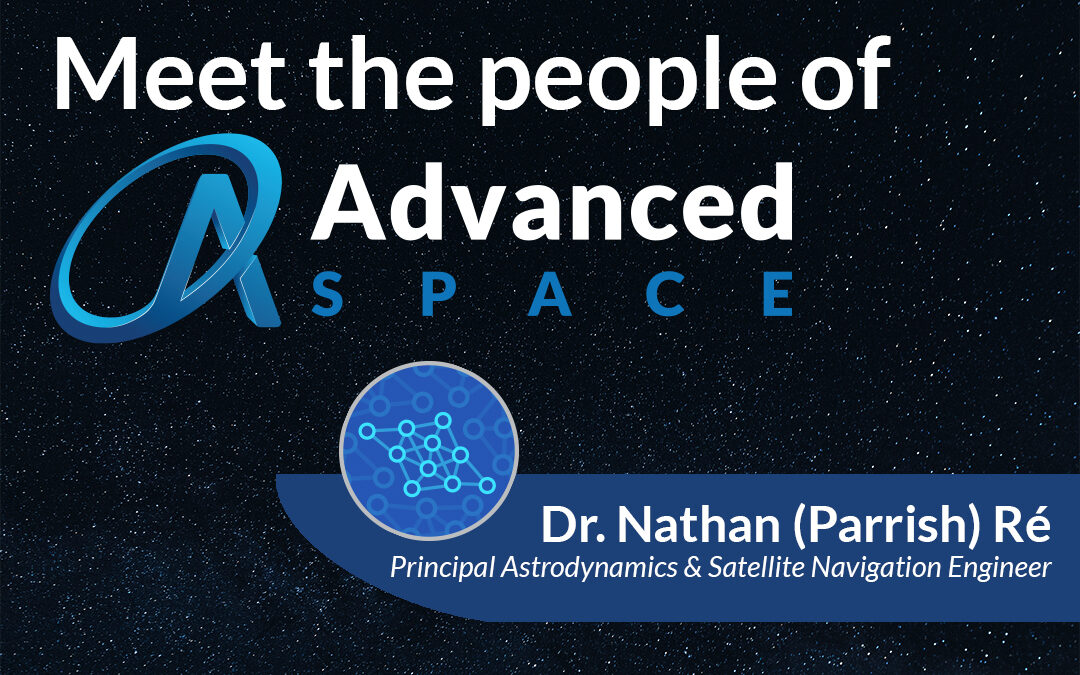
The team members at Advanced Space are the key to our success. Meet Dr. Nathan (Parrish) Ré, one of the company’s first employees who has been with the company for almost eight years.
What got you interested in AI for space?
In 2013, about a year into my PhD at CU Boulder, I had a conversation with a childhood friend who was playing with AI computer vision in his free time. I got really interested in it, so I bought a textbook and spent the next year trying to figure out how to apply AI to astrodynamics. At the time, the technology was much less user-friendly and there wasn’t much to go on. It took a few years to figure out a practical application that could also get me my degree.
How do you see work being utilized in the space industry in the next 20 years?
Twenty years is an eternity in computer technology and even more so for AI development. I think in that time, we will see new computing paradigms take precedence. A lot of effort from many players is focused on making AI-optimized processors that could be 1,000 to 1,000,000 times faster per watt than transistor-based processors. As that becomes the norm, many space applications will no longer be compute-constrained. New kinds of operations become feasible. Spacecraft are essentially mobile sensors with unique vantage points. With unlimited compute, you can process terabytes per second of data and draw meaningful conclusions from it in real time. There is a finite amount of data that can be transmitted over radio frequencies, but essentially unlimited potential for onboard computation.
What was your path to this industry?
I have always been interested in space. I grew up in the country with a great view of the stars. In high school, I was heavily involved in the FIRST robotics program. Aerospace engineering combined two big interests of mine (space and engineering) and had a reputation of being the “hardest” major, so I chose that. At Cal Poly, my senior project advisor was Dr. Kira Abercromby, who got her PhD at CU Boulder. I loved her classes in astrodynamics, so I followed in her footsteps.
What key moment in your life led you to space and exploring your Ph.D.?
There have been many decision points, but one that stands out is my visit to CU Boulder when I was considering grad schools. I originally applied to the master’s program, and I reached out to a few professors to try to get to know the University. Prof. George Born took me out to lunch and offered to take me on as his PhD student. I accepted on the spot and have only been confirmed in that decision.
What is your fun or interesting personal narrative?
Growing up, my dad was a musician and shared with me a creative, poetic love for space. My mom has lived her life as an educator and passed on her need for order and reason. These two sets of qualities shaped me, and engineering has given me an outlet for all of that.
Why Advanced Space for you and others?
Advanced Space has given me many opportunities to learn and grow professionally. I have gotten to work on a wide variety of interesting problems for an even wider variety of space missions, from a megaconstellation to the Moon to other planets. I have also been supported in pursuing new opportunities, with flexibility in my assignments and logistical support to help turn some of my ideas into strong proposals. We also have a bright team of engineers who do a great job delivering on awarded work.

What sparked your desire and passion to enable the sustainable, exploration, development, and settlement of space?
I think the future of humanity is spread across many planets. Space travel right now is analogous to our ancestors building crude rafts and canoes to sail the ocean. There are immense resources out there to improve everyone’s lives materially. There is also a spiritual significance to traveling beyond our tiny planet – the differences between nations and cultures are trivial when viewed from even a short distance away. Space exploration gives us something to aspire to and challenges to test ourselves on.
What is or has been one of your favorite projects that you have worked on at Advanced Space and why?
I’ll pick two. The first is NNEP (neural networks for electric propulsion), which is meaningful to me because I have been able to ride this idea for several years, from midnight brainstorming to a PhD to multiple rounds of NASA SBIR funding. I’m hopeful that it will help lay the groundwork for increasingly autonomous spacecraft in the future.
The other one is ESCAPADE, a science mission to Mars. A favorite memory is sitting down in a room full of scientists and engineers for a couple days to design a mission from scratch with whiteboard sketches and quick-and-dirty programming. The mission has gone through a lot of iterations since then, but it’s still an exciting concept.
